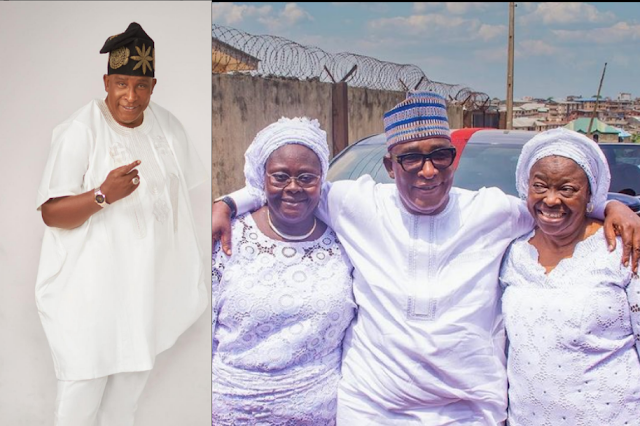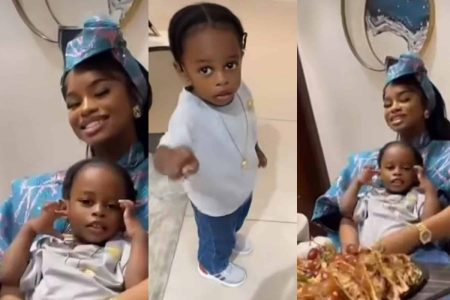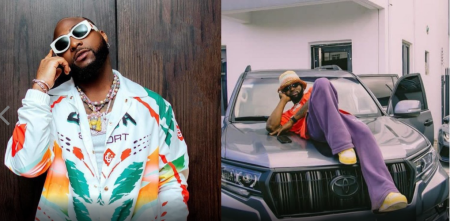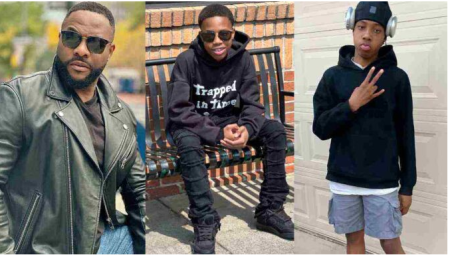In the entertainment industry, veteran actor Adebayo Salami, well known as Oga Bello, need little to no introduction.
The actor, who has worked in film for many years, recently spoke with Sunday Scoop about his family, career, and other topics.
What piqued your curiosity about the film industry?
I have always been interested in anything related to the arts and culture, even as a small child. There were a lot of events going on when I was growing up on Lagos Island.
Back then, were there any theater professionals you admired?
Naturally. Among them were Hubert Ogunde, Ojo Ladipo, also known as Baba Mero, Oyin Adejobi, and Ayinla Olumegbon.
What actions did you do in the past before entering the theater industry?
What motivated me was a TV show called Village Doctor that I used to watch and which was produced by Hubert Ogunde. Since the location of Ayinla Olumegbon’s rehearsals was close to our home, I also used to witness her plays.
Additionally, I used to hear drumming at the back of my school, and I was really interested in finding out where it was coming from. I made the decision to go watch them one day, and I eventually joined them. The Young Stars Concert Party was their moniker.
When you decided you wanted to start acting, how did your parents react?
Back then, no parent encouraged their child to pursue a career in theater production. Especially in the place I was raised in,
There was a strong emphasis on religion. People believed that since I was the first kid, it wasn’t appropriate for me to pursue an acting career. Back then, only those in professions like medicine and law were respected, and the profession was despised. It was a difficult time back then. However, I’m grateful that the tale has evolved as of late.
When did your parents begin to support your career choice?
They didn’t start accepting me until after I became famous, and it was one specific occurrence that made them decide otherwise. The man in the admissions officer’s office greeted us warmly and inquired about my needs. We received the admittance letter right away. That incident made my family and friends believe that I was on the correct path.
Were you aspiring to be anything other than an actor?
My goal was to become a lawyer, but I was unable to follow my dream at the time due to financial constraints.
Was the reason you pushed your son Femi to pursue a legal education because you wanted to be a lawyer?
I never talked to him about that. I encouraged him, but it was totally his decision to pursue legal studies. I named Femi after my godfather, Alhaji Femi Okunnu, who happens to be a lawyer. As his personal assistant while he served as the Federal Commissioner for Works, I worked with him.
Which was the first performance you took part in?
Regarding theatrical plays, my first involvement was in a performance called B’aiyebayehun, in which I played a witch doctor. Three of us tried out for that role prior to the production, and I was the one who got picked. That was back in 1971. However, we had been producing TV shows with Baba Mero—the founder of the Young Stars Concert Party—since 1969. However, the group then changed its name to Ojo Ladipo Theatre.
Do you remember the names of the people you started the profession with, your contemporaries?
Despite the many obstacles, we were passionate about our work and didn’t undertake it for financial gain. I was a library assistant at the Federal Ministry of Works and Housing at the time, in addition to being an actor. Any money I was able to make from my day job was ultimately used to pay for plays. We would occasionally wish to attend plays, but we would not have the funds to produce posters or do any kind of marketing.
Which production do you consider to be your turning point?
My rise to fame was facilitated by the popularity of the television show and the positive feedback we received. In terms of theater plays, my breakout performance was Ogbongbemiga, which we presented at Glover Hall on Lagos Island. Many people attended and were enthralled with the play.
Which was the first video you ever did at home?
We were producing on celluloid at the time, so I didn’t start making home videos until later. I recall filming Ogun Ajaiye, my first motion picture, in 1985. Omo O’rukan, my second motion picture, was shot in 1987. I shot Eri Okan in 1989. But in 1993, I began making home videos, and Asewo to Re Mecca was my first film.
The movie Asewo to re Mecca was a huge hit; how did you manage to pull it all together?
Writing the story is the first step in the process. All I wanted to do was give a lesson on the relationship that humans have with God. It concerned two prostitutes who made a promise not to go back to their sinful pasts after visiting Mecca. But one of them broke her word, while the other stuck to hers, and they both received the just compensation for their deeds. I made that film using the same techniques we used to shoot motion pictures in theaters. I thought the home videos from back then may have been better, and Asewo to re Mecca ended up becoming a classic.
What factors did you take into account when selecting the movie’s principal actresses?
The bodies of Toyin Adegbola and Sola Sobowale for the starring roles were just what I was searching for. They must also be talented because they passed the auditions that we held for them.
I didn’t truly encounter any obstacle throughout the filming of the film because, at the time, both marketing and money were strong.
Which lesson did you take away from the film the most?
I turned a profit, which raised my visibility. Additionally, it altered the appearance of home videos produced at the time.
To date, how many films have you produced?
I’ve made seventeen films.
Have you ever had acting instruction?
Indeed, I did. Practical experience is the most crucial component of training. We were training during the times we used to go to rehearsals. I once joined the British Council, where I received training as well. Later on, I went to a school connected to the University of Lagos. In the interim, I also went to a lot of seminars and workshops and read books on stage production.
Do you frequently include your kids in the making of your films?
They were still in school when they were younger, so I didn’t include them. However, my kids used to accompany me to our rehearsals whenever they were on vacation because I was a member of a group named Awada Kerikeri.
But now that a few of them have entered the field, we collaborate.
When your kids showed an interest in becoming actors or actresses, how did you feel at first?
I felt alright. All I asked of them was that they finish their schooling; beyond that, it was up to them to pursue their own interests. I never put them under any duress.
When they expressed a desire to enter the field, what guidance did you offer them?
They have been following my advice, which I gave them based on my experience.
Even now, they still come to see me and I help them with whatever confusion they may have. I give them advice on manners and how to interact with their followers, among other things. This kind of experience is beyond my reach, and I wouldn’t wish to impart it to my offspring who work in the same industry as me.
when you went out with Femi, had there ever been occasions where he had more fans than you?
A father would always be pleased with such an accomplishment since it is a source of pride. However, it’s never that way since supporters approach me in the same manner that they approach him.
How does it make you feel to read or hear bad things about your kids?
My initial instinct whenever I hear something like that is to investigate its veracity. Not all of the published content is accurate. I have methods for correcting them if I discover that what they did was incorrect. Furthermore, I would feel horrible and take action if they were the target of lies, as this could harm their reputations.
Considering the size of your family, how did you manage to raise them in harmony and love?
It’s not something I did; it’s just the grace of God. The harmony and affection that permeate my home and the progress that each of my kids is making make me happy.
What attributes does a successful actor need to have?
To begin with, you need to be gifted and have a strong desire for the work. Additionally, one should receive training and practice doing things the right way. You’d be accepted by people if you did such things.
What do you think is wrong with the film industry right now?
We have a serious issue with piracy, which I think everyone is aware of. We must organize our distribution and marketing strategies. Additionally, we
need money in order to make quality films.
Is there anything you would do differently if you could go back and change things?
Raising a large family is one thing I may have called a mistake, but I see it as destiny.
How do you relax?
I’ve never really had much time to relax because I’m so committed to my work. But I like to be among my childhood pals while they are chatting and having a good time. I also enjoy listening to music from indigenous artists like Yusuf.
Have you ever considered pursuing a career in singing?
I’m not a vocalist, sorry. However, music and theater are entwined, and I frequently write songs for motion pictures.
What fashion sense do you have?
I prefer to dress tastefully, simply, and neatly. I drive a simple car and go about my life in a very simple manner.







